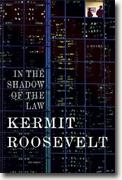In the Shadow of the Law
Kermit Roosevelt
book reviews:
· general fiction
· chick lit/romance
· sci-fi/fantasy
· graphic novels
· nonfiction
· audio books
· author interviews
· children's books @
curledupkids.com
· DVD reviews @
curledupdvd.com
newsletter
win books
buy online
links
home
for authors
& publishers
for reviewers

 |
In the Shadow of the Law Kermit Roosevelt Picador USA Paperback 452 pages June 2006 |
|
Though In the Shadow of the Law has been described by some as “a legal thriller,” I disagree. lt is more a legal procedural and not to its serious detriment, since thrillers have been overly thick on the ground. They trigger fixed expectations: characters who experience physical peril and face potentially destroyed careers while fighting evil conspiracies and sensing betrayal by those once trusted.
Needless to say, any legal victory occurring in fiction or fact may fail the test of representing justice as defined by Potter Stewart, who served on the Supreme Court from 1958-'81. “Fairness,” he said, “is what justice really is.” However, whether thriller or procedural, a lot of law-centered fiction seems to convey, as this book does, cynicism aplenty, including but not limited to a fairness deficit. Such soul-shrinking cynicism has long-since infected the top tier of attorneys in the Washington, D.C., firm of Morgan Siler. It hovers over the latest crop of young associates - graduates of prestigious law schools - who are finding their footing in the real world of law. Key among this group are what I think of as the Four Bs: bumbling Mark; below-par Ryan; beautiful/bright Katja; and brilliant Walker. Their ice sculpture of a boss, Peter Morgan, heads the firm, and earns his B designation for being brutal, as in changing his home's locks while his wife is grocery shopping - a waste-no-words way to announce that the long marriage is over. In Morgan, author Kermit Roosevelt has created a character who barely escapes being a caricature of the cynical, crass, power-seeking breed of attorney, all of whose instincts, including the sexual, have been over-powered by ambition. That central drive, Roosevelt implies in this description, ruled Morgan even as a young man just finishing law school: “The body he dreamed of mounting was neither corporeal nor female; it was corporate and immortal. In those melting moments when fantasy came, just before sleep, he saw himself sprawled victorious atop a large organization.”With such a negative role-model, such workloads, such intricacies both of law and of the human condition to absorb, how can the young associates help being grossly skewed rather than gracefully shaped by their initiation into the profession? Two cases test them. One is a pro-bono (no fee) effort to lift the death sentence of a convicted rapist/double murderer; the other, a fat-fees project to erect a bulwark of complicated corporate law shielding a client from liability payments for multiple deaths in a massive explosion of negligently stored chemicals. Fortunately for the frazzled, stressed-out associates, the two partners who lead them in these cases are considerably less odious mentors than Morgan. They are the brilliant litigator Harold Fineman, who remains sensitive enough to the human condition that he recognizes the arid state of his own personal life, and Wallace Finn, once the firm's star who, after a heart attack, found himself down-graded to the generally disrespected pro-bono function. An implausible plot twist serves to settle the death row case, though the outcome is hardly joyous for the inmate's family. Still, a central legal wrong is righted, representing a shard of light - at least for the associates. The chemical explosion case appears to hinge on what seems to this layperson a highly complex and labyrinthine legal tool for sealing off a corporation's assets from liability-through-negligence claims. Now just what was it Justice Potter Stewart said about fairness? Neither the kind of speed-read that seems custom-written for whiling away time on a commute train nor a tarted-up (a la thriller) plot where law itself and its practitioners are forever under perilous siege, this novel challenges precise pigeon-holing. Certainly, it could've used more flashes of mordant humor. One such mood lifter begins with an associate's remark that an opposing attorney has “a real poker face.” “Botox,” a partner explains; “Very popular with the trial lawyers now. Some witness drops a bombshell on you in court and the jury won't see any reaction. It stops sweat at the hairline, too. It's a little creepy going up against those guys.” Originally published on Curled Up With A Good Book at www.curledup.com. © Norma J. Shattuck, 2006 |
|
|
|
 Click here to learn more about this month's sponsor! |
|
| fiction · sf/f · comic books · nonfiction · audio newsletter · free book contest · buy books online review index · links · · authors & publishers reviewers |
|
| site by ELBO Computing Resources, Inc. | |
 As a procedural, this first novel presents cases in which opposing attorneys duel with weapons handed them by those who make laws (legislators) and by others who interpret those laws (various levels of the judiciary). Of course, other weapons may determine victory or defeat for clients, such as the comparative doggedness, mental acuity, and dedication to victory of the attorneys.
As a procedural, this first novel presents cases in which opposing attorneys duel with weapons handed them by those who make laws (legislators) and by others who interpret those laws (various levels of the judiciary). Of course, other weapons may determine victory or defeat for clients, such as the comparative doggedness, mental acuity, and dedication to victory of the attorneys.